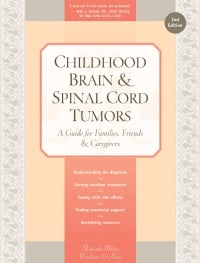Childhood Brain and Spinal Cord Tumors
Parent-to-parent programs
Some pediatric hospitals, in conjunction with parent support groups, have developed parent-to-parent visitation programs. The purpose of these visits is for veteran parents to provide one-on-one support to parents of newly diagnosed children. The services provided by the veteran parent can be informational, emotional, or logistical. The visiting parent can:
- Empathize with the parents
- Help notify family and friends
- Ease feelings of isolation
- Provide hospital tours
- Write down parents’ questions for the medical team
- Offer advice about sources of financial aid
- Explain unfamiliar medical terms
- Be available by phone for any problems that arise
- Supply lots of smiles and hugs, and (above all) hope
Families of newly diagnosed children can ask whether the hospital has a parent-to-parent program. If not, ask to speak to the parent leader of the local support group. Often, this person will ask a parent to visit you at the hospital. Many parents are more than willing to visit, as they know only too well what those first weeks in the hospital are like. They are often accompanied by their child who has completed therapy and is rosy-cheeked and full of energy—a living beacon of hope.
I am the parent consultant for our region. Among the services I provide are: meet with all newly diagnosed families; give a packet of information to each child or teen with cancer; continue to visit the families whenever they return to the hospital; educate families about the various local resources; provide moral support; stay with children during painful procedures if the parents can’t; organize and present all of the school programs; liaison with schools for school reentry; organize and send out monthly reminders for parent support group meetings, child support group meetings, and sibling group meetings; send out birthday cards to kids on treatment; serve as activities director at the summer camp; and generally try to help out each family in any way possible. My job is a part-time, paid position funded through the local independent agency, Cancer Services of Allen County, Inc.
Table of Contents
All Guides- Introduction
- 1. Diagnosis
- 2. The Brain and Spinal Cord
- 3. Types of Tumors
- 4. Telling Your Child and Others
- 5. Choosing a Treatment
- 6. Coping with Procedures
- 7. Forming a Partnership with the Treatment Team
- 8. Hospitalization
- 9. Venous Catheters
- 10. Surgery
- 11. Chemotherapy
- 12. Common Side Effects of Chemotherapy
- 13. Radiation Therapy
- 14. Peripheral Blood Stem Cell Transplantation
- 15. Siblings
- 16. Family and Friends
- 17. Communication and Behavior
- 18. School
- 19. Sources of Support
- 20. Nutrition
- 21. Medical and Financial Record-keeping
- 22. End of Treatment and Beyond
- 23. Recurrence
- 24. Death and Bereavement
- 25. Looking Forward
- Appendix A. Blood Tests and What They Mean
- Appendix C. Books and Websites

